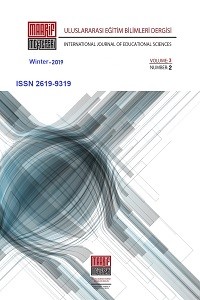Öz
Learner
control, generally, is the strategy of giving the student the opportunity to be
effective in the selection and implementation of both content and teaching
approaches related to teaching in the teaching process. In other words, it is
the situation where the learners are given a certain level of autonomy in order
to manage their own learning experiences themselves. Because; learning is not a
passive process of taking, but an active meaning-making process, and it is the
learner individual who performs the learning.The general purpose of this research is to determine
the level of “Learner Control Strategy’’ used in the lessons based on the
opinions of Law School students studying at Private and State Universities.
Anahtar Kelimeler
Learner Control Detailed Order Theory Active Learning Teaching Theories
Kaynakça
- Armstrong, A. M. (1989). Persistence and the causal perception of failure: modifying cognitive attributions. Journal of Educational Psychology, 70(2), 154-166.
- Bandura, A., & Locke, E. A. (2003). Negative self-efficacy and goals effects revisited. Journal of Applied Psychology, 88(1), 87-99.
- Eom, W., & Reiser, R. A. (2000). The effects of self-regulation and instructional control on performance and motivation in computer-based instruction. International Journal of Instructional Media, 27(3), 247-261.
- Farrell, I. H. (2000). Navigation tools effect on learners’ achievement and attitude (Dissertation Thesis). Polytechnic Institute and StateUniversity, Virginia.
- Fer S., & Cırık, İ. (2007). Yapılandırmacı öğrenme, kuramdan uygulamaya. İstanbul: Morpa Yayıncılık.
- Fraenkel, J.R., & Wallen, N.E. (1993). How to design and evaluate research in education. NY.: McGraw-HillInc.
- Hoffman, S. (1997). Elaboration theory and hypermedia: Is there a link? Educational Technology, 3 (1).
- Karadağ, E., Deniz, S., Korkmaz, S., & Deniz, G. (2008). Yapılandırmacı öğrenme yaklaşımı: sınıf öğretmenleri görüşleri kapsamında bir araştırma. Uludağ Üniversitesi Eğitim Fakültesi Dergisi, 21(2),383-402.
- Karasar, N. (1995). Bilimsel araştırma yöntemi. Ankara: 3A Araştırma Eğitim Danışmanlık.
- Karataş Coşkun, M. (2017). İçeriğin öğretim için düzenlenmesi. İçinde Öğretim ilke ve yöntemleri (ss. 90-140). Ankara: Pegem Akademi.
- Köymen, Ü. (1996). Öğretim yöntemlerinin kuramsal temelleri ve tarih öğretiminden bir örnek. Eğitim ve Bilim, 20 (100), 34-43.
- Kutlu, M.O. (2002). Öğretimi ayrıntılama kuramına dayalı matematik öğretimi ve bilgisayar destekli sunumun başarı ve kalıcılığa etkisi. Sakarya Üniversitesi Eğitim fakültesi Dergisi, Özel Sayı, 2.Uluslararası Eğitim Teknolojileri Sempozyum ve Fuarı Bildirileri, 4, 305-322.
- Kutlu, M.O. (2012). Developing a scale on the usage of a learner control strategy. Educational Research and Reviews,7(10),244-250.
- Merrill, M.D., Kelety, J.C., & Wilson, M. (1981). Elaborative theory and cognitive psychology. Instructional Science, 10(3), 217-235.
- Merrill, M. D. (1983). Instructional design theories and models. Hillsdale, NJ: Erlbaum Associates.
- Milheim, W. D., & Martin, B. L. (1991). Theoretical bases for the use of learner control: Three different perspectives. Journal of ComputerBasedInstruction, 18(3), 99-105.
- Reigeluth, C.M., & Darwezah, A.N. (1982). The Elaboration theory’s procedure for designing instruction; A conceptual approach. Journal of Instructional Development, 5, 22-32.
- Reigeluth, C.M.(Ed.). (1983). Instructional Design Theorie sand Models, An overview of their current status. Hillsdale, NJ: ErlbaumAssociates.
- Reigeluth, C., & Stein, R. (1983). The elaboration theory of instruction. In C. Reigeluth (ed.), Instructional Design Theories and Models. Hillsdale, NJ: Erlbaum Associates.
- Reigeluth, C. M. (1987). Lesson blueprints based on the elaboration theory of Instruction. InC. M. Reigeluth (Ed.), Instructional theories in action; Lessons ıllustrating selected theories and models (pp.245-288). Hillsdale, NJ: Erlbaum Associates.
Ayrıntılar
| Birincil Dil | İngilizce |
|---|---|
| Konular | Eğitim Üzerine Çalışmalar |
| Bölüm | Makaleler |
| Yazarlar | |
| Yayımlanma Tarihi | 31 Aralık 2019 |
| Yayımlandığı Sayı | Yıl 2019 Cilt: 3 Sayı: 2 |

